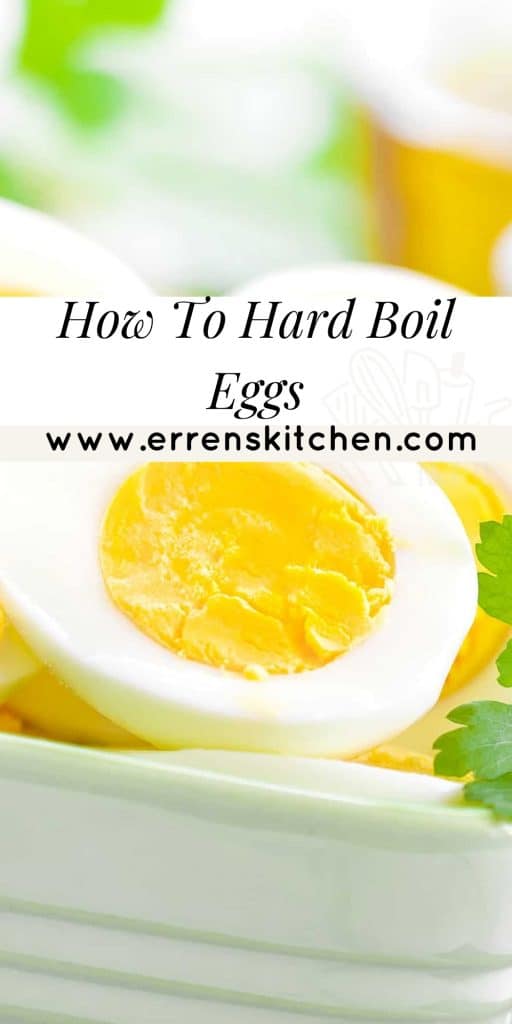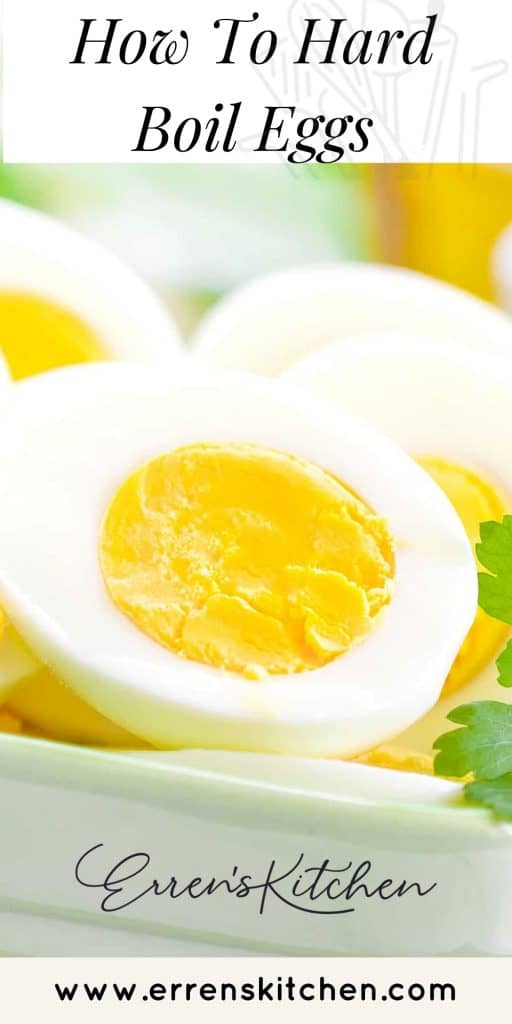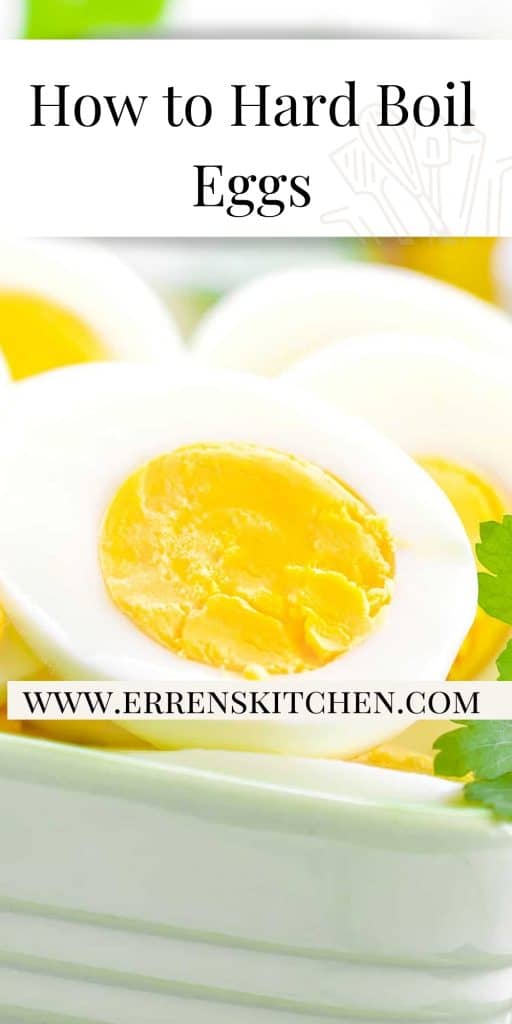Learn how to cook hard boiled eggs to perfection at every turn! This easy method will make them easy to peel with perfectly set yolks.
Use them in Potato Salad, Cobb salad, egg salad sandwiches or simply as a healthy snack.
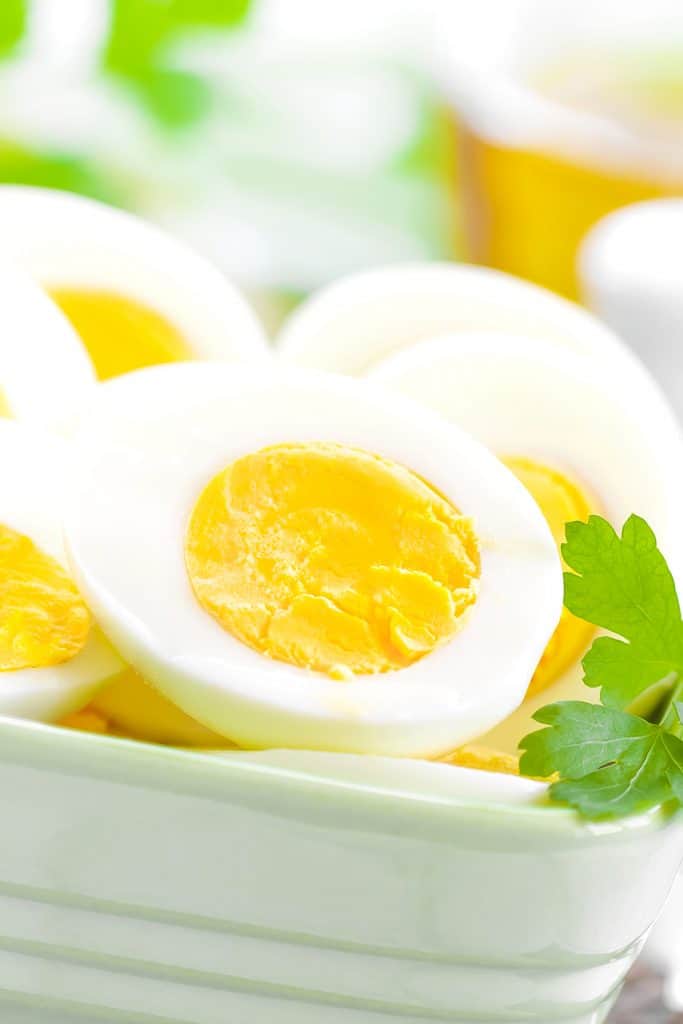

The Only Guide You’ll Ever Need
There’s nothing worse than badly cooked hard-boiled egg! If you’ve been disappointed by recipes that produce rubbery eggs with that dreaded gray-green ring around the yolk, you are not alone! Hard boiled eggs are harder to perfect than you’d think, but with this guide and my handy tips, you’ll be making perfect hard cooked eggs every time.
Why This Works
- Starting with cold water helps prevent cracks due to drastic temperature changes and prevents over cooking.
- A half teaspoon of salt added to the cooking water helps reduce cracking. If a crack occurs the salt also slows the leaking egg whites.
- A teaspoon of vinegar helps to make peeling easier.
What Eggs Are Best
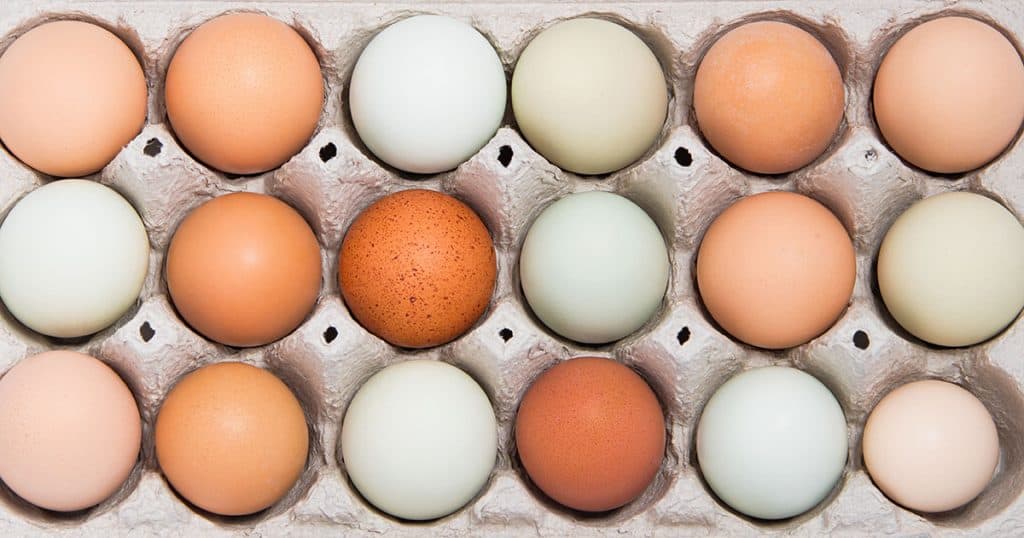

When choosing eggs for hard boiling, it’s best to use eggs that aren’t too fresh as fresher eggs are harder to peel when cooked. Using week old eggs is a good rule of thumb. Just be sure to check the date on the carton and plan accordingly.
On Egg Color: Chicken eggs come in white, brown, blue, green, and everything in between. Whatever the color, they cook in exactly the same way.
HowTo Make Hard Boil Eggs
- Place the eggs in a pot of cold water.
- Bring the pan to a rolling boil.
- Cover and let stand on the burner for 12 to 15 minutes.
- Let cool in an ice bath.
- Peel and enjoy!
Step By Step Instructions
Place the eggs in a single layer in a pot or saucepan. Add cold water to cover them by at least 2 inches of water.
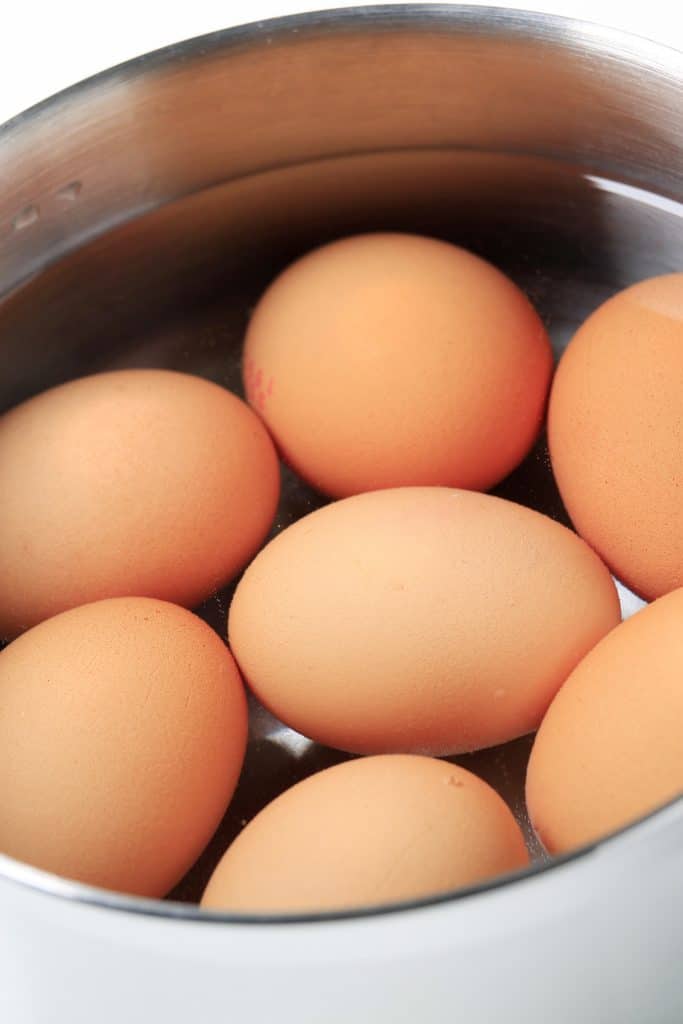

Heat the pot over high heat and bring the water to a full rolling boil.
A rolling boil is a vigorous, continuous boil where large bubbles erupt constantly on the surface of the water.
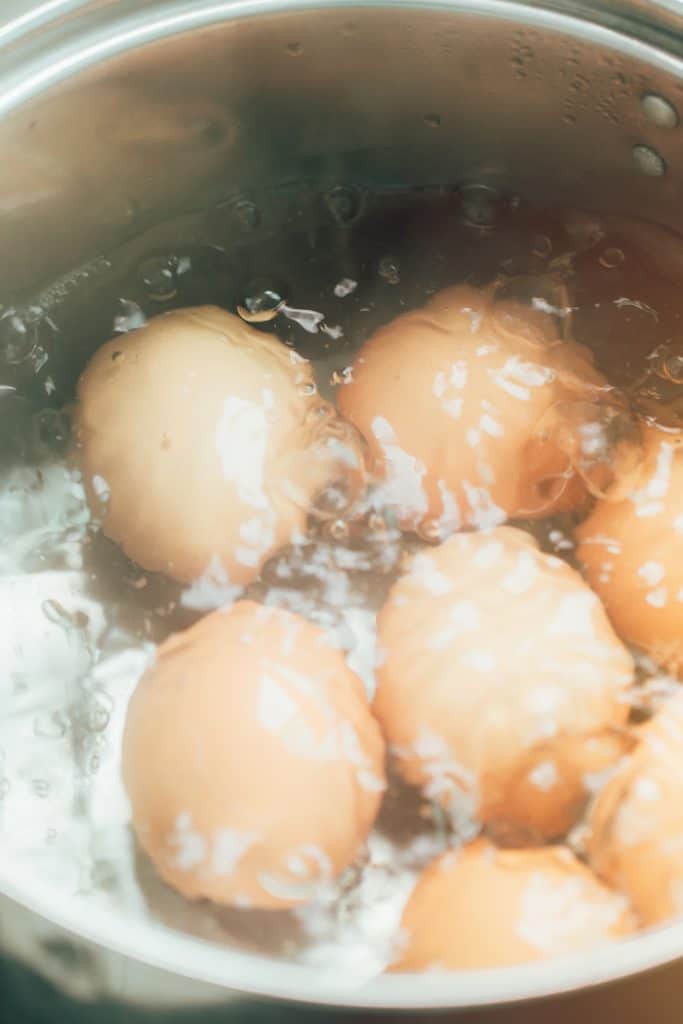

Cover the pot with the lid, turn off the burner and place and leave to sit in the hot water for around 15 minutes (read on for more detailed information on cooking times).
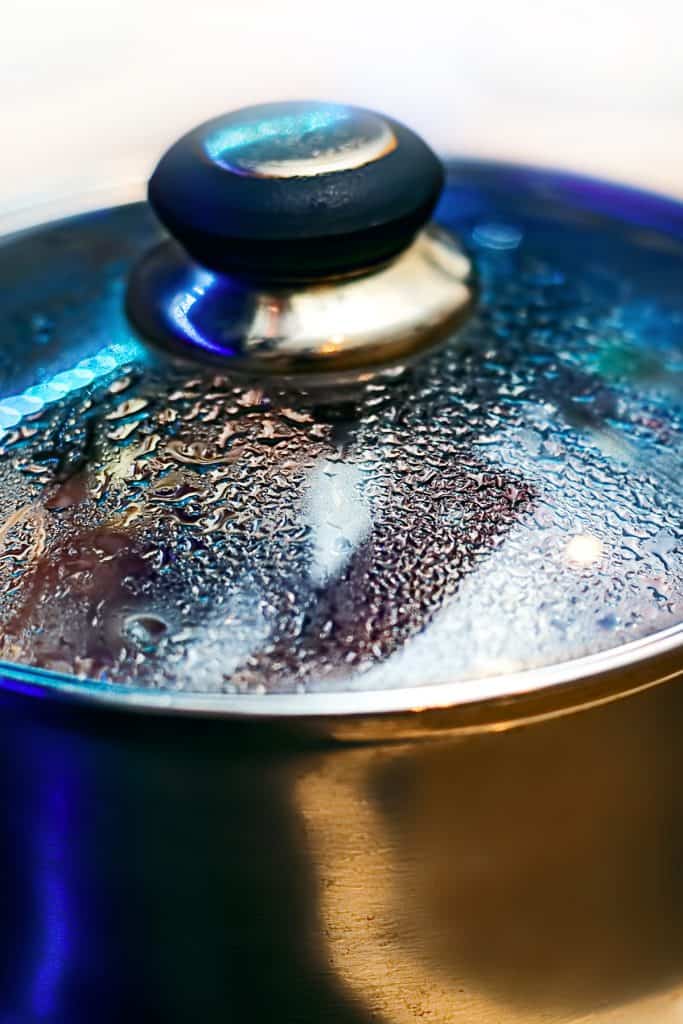

Remove the eggs from the pan and place in an ice bath for around 15 minutes.
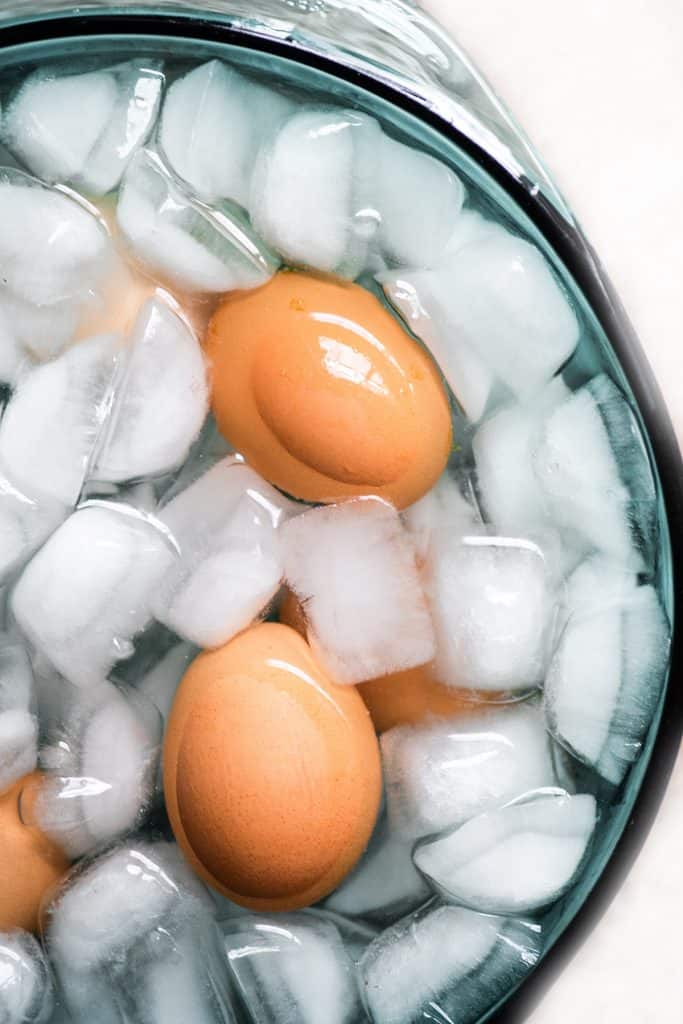

Peel your eggs and serve!
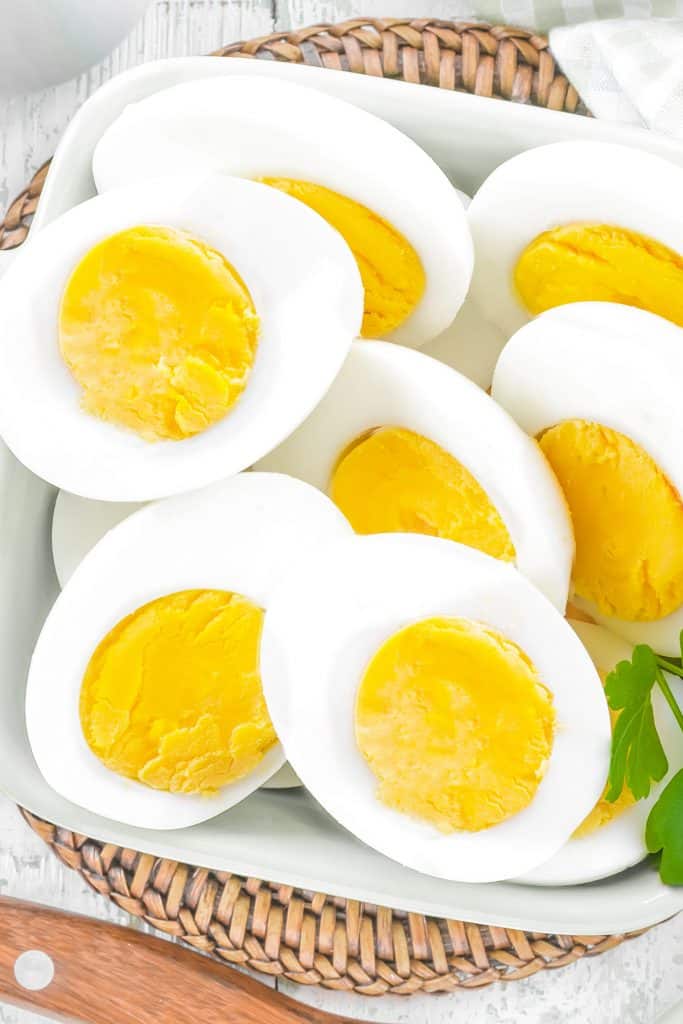

How Long to Boil Eggs
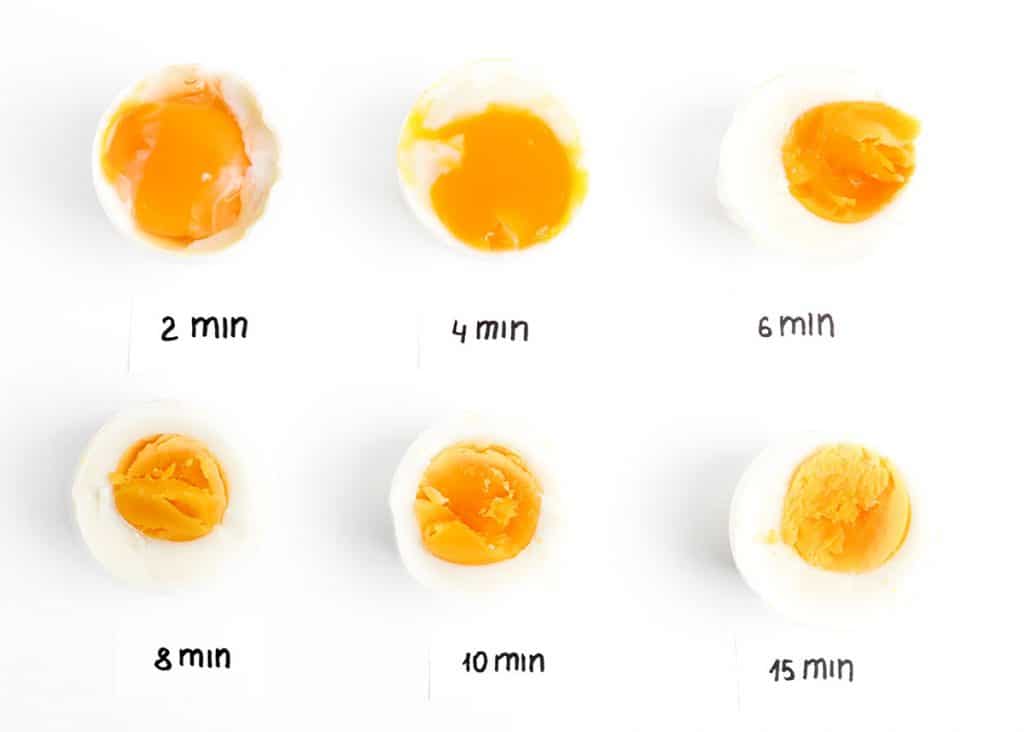

Cooking times may vary depending on the size and freshness of your eggs, stove, cookware, and so much more, but here’s a guide to approximate cooking times based on large eggs.
Soft Boiled Eggs
| Yolk Firmness | White Firmness | Cooking Time |
| Soft yet Firm Yolk | Soft yet Runny | 4-5 minutes |
| Soft yet Firm Yolk | Soft | 6 minutes |
Hard Boiled Eggs
| Yolk Firmness | White Firmness | Cooking Time |
| Creamy Yolk | Firm | 7 Minutes |
| Firm yet Creamy Yolk | Firm | 8 Minutes |
| Firm Yolk | Fully Set | 9-10 Minutes |
| Very Firm Yolk | Fully Set | 11-15 Minutes |
Make A Tester Egg – When cooking a large batch eggs, try making an extra egg. Then after 10 minutes, check for doneness by removing it with a slotted spoon, running it under cold water to cool, and cut it open. If it’s not done enough for your liking, Cook the other eggs a minute or two longer.
Adjusting Cooking for High Altitude
Hard cooking eggs at higher altitudes can be a little tricky if you follow a recipe not specifically written for your situation. Here are some tips to make things a little easier, but please note some altitudes may need a little tweaking.
- Use older eggs instead of fresh. 1 or 2 weeks old are best.
- Use room temperature eggs – 15-20 minutes on the counter is a good rule of thumb.
- Boil the eggs on a rolling boil for 15 minutes instead of leaving them to sit in the pot off the heat. Then leave them in the pot off the heat, uncovered for a further 3 minutes.
Storing Instructions ?
Stored in the refrigerator, hard boiled eggs will keep for about 7 days.
For best results, keep hard boiled eggs in their shells until you’re ready to serve them.
How to Peel Hard Boiled Eggs
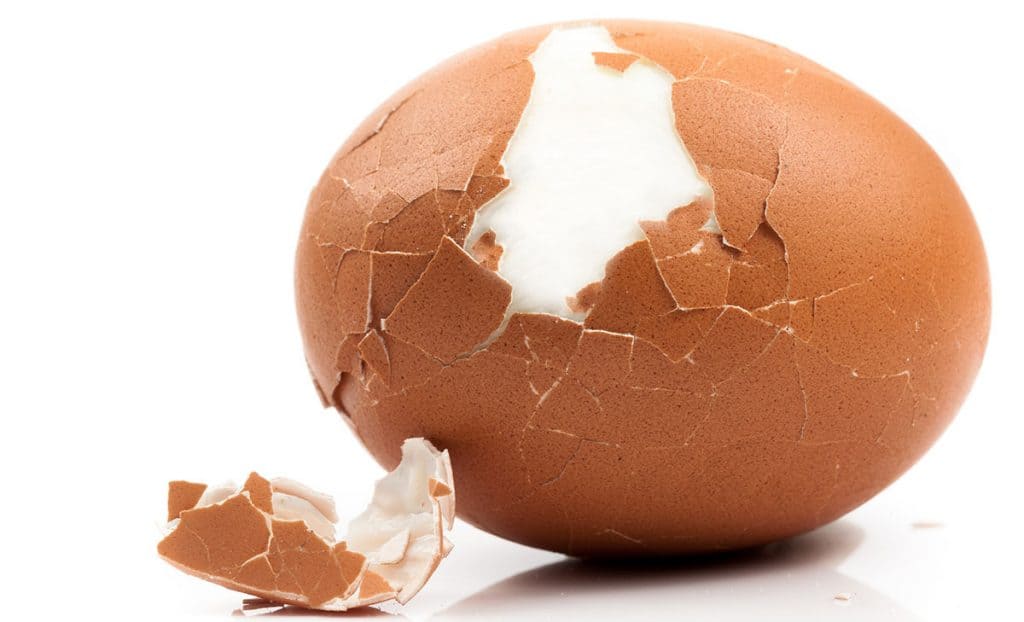

Fresher eggs are harder to peel. Using week old eggs for hard boiling makes things easier.
- Cool the eggs before peeling.
- Crackle the shell – crack the entire egg shell all by gently tapping it on a hard surface.
- Gently roll it between your hands to loosen the shell.
- Then place it under cold running water or immerse it in a bowl.
- Peel the egg in the water starting from the larger end.
Erren’s Top Tips
- Make a tester – When finding the right cooking time for your To check for doneness, by removing it with a spoon, running it under cold water, and cutting it open. If it’s not done enough for my taste, I’ll cook the other eggs a minute or two longer.
- It’s important to let the water come to a full rolling boil. A rolling boil is a vigorous, continuous boil where large bubbles erupt constantly on the surface of the water.
- If you want the yolks in the center of the eggs, store the raw eggs upside down before boiling, this helps counter the yolk.
- Don’t skip the ice bath. This helps to avoid the unsightly green tinge to the cooked yolk. Transferring the eggs to the ice bath stops the cooking process. It also aids the shell peeling process, separating the membrane from the shell.
FAQs
Why do egg shells stick to boiled eggs?
Fresh eggs tend to stick to the shell when boiled because they have a high acid content. An older egg has lower acidity and makes it less likely to stick to the shell when boiled.
Using eggs that aren’t too fresh with a little vinegar and salt in the cooking water helps to make peeling easier.
Yes you can (as in the method above) but do not place them into boiling water, the shells will crack. Start with cold water and bring to the boil.
If you aren’t using the eggs straight away it’s best to leave them in the shell when placing in the refrigerator. Cooked eggs in the shell will last in the fridge for up to a week.
Stay Updated
Receive new recipes & dinner ideas straight to your inbox!
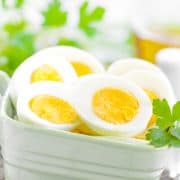

Let’s Make
How to Cook Hard Boiled Eggs
A guide to getting the perfect hard boiled egg. No fuss, great results every time.
Prep1 minute
Cook15 minutes
Total21 minutes
cooling: 5 minutes
Serves: 6
Prevent your screen from going dark
Instructions
-
Place the eggs in a single layer in a pot or saucepan. Add cold water to cover them by at least 2 inches of water.
-
Cook over high heat and bring the water to a rolling boil.
-
Cover the pot and let stand on the burner for 12- 15 minutes.
-
Place the cooked eggs into an ice bath and let soak until cool.
-
Peel the eggs (or leave in their shells and refrigerate for later use).
Tips + Notes
- It’s important to let the water come to a full rolling boil. A rolling boil is a vigorous, continuous boil where large bubbles erupt constantly on the surface of the water.
- If you want the yolks in the center of the eggs, store the raw eggs upside down before boiling, this helps counter the yolk.
- Don’t skip the ice bath. This helps to avoid the unsightly green tinge to the cooked yolk. Transferring the eggs to the ice bath stops the cooking process. It also aids the shell peeling process, separating the membrane from the shell.
Nutrition Information:
Calories: 63 (3%)| Carbohydrates: 1g| Protein: 6g (12%)| Fat: 4g (6%)| Saturated Fat: 1g (6%)| Polyunsaturated Fat: 1g| Monounsaturated Fat: 2g| Trans Fat: 1g| Cholesterol: 164mg (55%)| Sodium: 256mg (11%)| Potassium: 61mg (2%)| Sugar: 1g (1%)| Vitamin A: 238IU (5%)| Calcium: 25mg (3%)| Iron: 1mg (6%)
Nutritional Data Disclaimer

